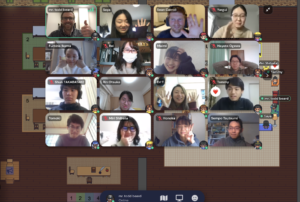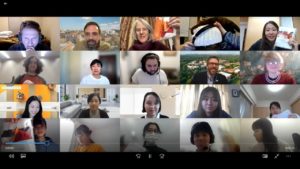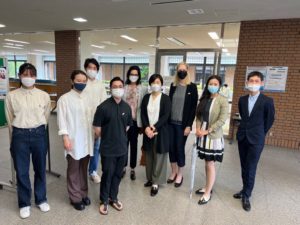by Alexandra DeMarco

Friends Across the Sea participants meeting on Gather.town during Todd Beard’s class
In the spring of 2022, students from the University of Tennessee, Knoxville had the unique opportunity to virtually connect with students from three Japanese universities during the Friends Across the Sea program, hosted by the English Language Institute in collaboration with the Japanese Program.
Funded through a Department of State grant, staff at ELI designed Friends Across the Sea to help Japanese university students improve their English skills by studying with an instructor from Tennessee and also conversing with American students through online platforms such as Zoom and Gather.town.
ELI decided to pursue the online program when enrollment numbers at the institute decreased amid the COVID-19 pandemic, Em Chitty, ELI’s interim director, said.
“The purpose of this was to offer communicative practice to Japanese undergraduates, because they have plenty of opportunity to practice grammar and writing, but very little to practice speaking,” Chitty said.
The program was strongly supported by Noriko Horiguchi, associate professor of Modern Japanese literature and chair of UT’s Japanese Program. She recruited 21 American students from 500 students in the Japanese program to join the 21 Japanese students for Friends Across the Sea.
“I’m the only one usually in the classroom who is from Japan, so I think this was a very valuable opportunity for UT students to actually meet these students their age from Japan and learn from them about their personal experiences,” Horiguchi said. “It’s about their personal experience, life history, life story in this larger context of local or national stories and history. I think that was really valuable.”
Class Assembled
Chitty and Doug Terry, acting associate director at ELI, recruited students for the online program from three universities in Japan: Kobe University, Gakushuin University and Kansai Gaidai University.
“We asked the universities to recruit the students, and we had a basic recruitment list and then we picked the people that we thought would be the best for this, and we were looking for candidates who are not too advanced and not too basic,” Chitty said. “We were looking for that sweet spot, where these communicative exercises and instruction would be the most useful to this particular population, and we’ve had a good list, good candidates.”
Terry facilitated discussions with the partner institutions and participating students to organize the program, which could sometimes be challenging considering the 13-hour time difference between Eastern Standard Time and Japanese Standard Time.
Eventually, Terry and his colleagues across the sea developed a sort of shorthand to effectively communicate about meeting times in each country.
Students gather in Gather.town
For the classroom lessons, Charity Davenport, a former instructor at ELI, suggested using Gather.town, an online platform that mimics a real classroom. In the “Gather space,” students can “walk around” a virtual classroom with avatars that interact with the space by clicking on different objects and areas.
Japanese students met every weekday at 7 p.m. EST/8 a.m. JST, to learn about English communication techniques, cultural differences and more. Beard taught the class in English, and the Japanese students also conversed with one another in English. Twice a week, the Japanese and American students met together in two cohorts for conversation hours at 8 p.m. EST/9 a.m. JST.
Todd Beard, the director of English for Academic Purposes at Lipscomb University, led the virtual classroom. Beard has a background in teaching English as a Second Language and built upon ELI’s curriculum for the course to design his daily classes with the intention of encouraging students to engage in conversation.
Chihiro Kawakami, a student majoring in International Relations at Kansai Gaidai University, decided to enroll in the Friends Across the Sea program after hearing about the opportunity from her school’s Center for International Education.
She enjoyed exploring Gather.town and using the interactive platform to talk with other students.
“I thought it was really interesting because we can move around the classroom, and you can go to someone else and just talk, too, and it’s really interesting because we are in different parts of the world, but then we are in the same classroom talking together. … It was a really nice experience,” Kawakami said.
The Hot Topic
Several Japanese students in the program enjoyed Beard’s more casual teaching style, which gave students the opportunity to ask questions whenever needed and speak with other students in English.
Saki Tanimasu, a student majoring in English at Kansai Gaidai University, found the daily sessions with Beard and the other Japanese students quite fun.
“Mr. Todd, who was the teacher, was very frank, and he tried to make our class more energetic, and I really liked the atmosphere,” Tanimasu said.
In particular, students from Japan were so fascinated by the unit on friendship and dating that the lesson extended well beyond its dedicated week, Beard said.
“That was the topic that we probably spent a full two weeks discussing because the students really started opening up, and we found some really fun things that happened and a lot of comparisons and differences between dating culture and friendship culture in Japan,” Beard said. “I’ll say that was one of the key memories that a lot of us still laugh about.”
Kawakami enjoyed the lessons on dating and other cultural phenomena because of the opportunity to learn colloquial, American slang, which she likely wouldn’t have firsthand access to in an English class in Japan.
“We don’t really learn slang (in Japan). … Japanese teachers don’t even know American slangs and those words. … I learned a lot from the program,” Kawakami said.
Kawakami and another student studying English at Kansai Gaidai, U. Keigyo, both also mentioned being intrigued by the notion of the American Super Bowl, which Kawakami had never heard of before the program.
An Interactive Cultural Experience
In their twice per week meetings, UT students had the chance to converse with Japanese students about various topics, including cultural differences, and practice language skills.
Ross Cullum was one student recruited for the program while in his third year of Japanese language classes at UT. Cullum is double majoring in business management and supply chain management with a minor in Japanese, and he joined Friends Across the Sea with the goal of furthering his Japanese education.

UT and Japanese students meet during the Friends Across the Sea program
“We got to basically work with our partners from Japan to help them better their English conversation skills,” Cullum said. “In Japan, they practice English a lot longer than we practice Japanese in the U.S., so some of them had been practicing since elementary school, but this was, for some of them, their first real experience to actually talk to English speakers, so I thought it was a really great opportunity to help them out. Their English was definitely a lot better than my Japanese is.”
At the end of the six-week program, each Japanese student was paired with an American student to work on a presentation about a particular cultural difference between America and Japan. Cullum and Kawakami worked together and gave a presentation on the differences between public transportation in the U.S. and Japan, though the two had trouble picking a topic because of how fascinating they found all their options.
The two students ended up meeting outside of their required conversation hours to finish their presentation and in the process became friends who stay in touch from across the sea to this day.
Tanimasu and her partner worked on a presentation about the difference between food culture in the U.S. and Japan, and her partner provided his perspective partially based on working in a Japanese restaurant in the U.S.
“In Japan, we don’t fry sushi, but (my partner) mentioned that sushi (is) sometimes fried in the U.S.,” Tanimasu said.
At the end of the six weeks, Beard said that students’ most noticeable growth was their confidence in their English-speaking skills.
“Often with language learning, most people have at least a certain amount of knowledge of grammar, of vocabulary, and of course, those things can always be improved,” Beard said. “But unless you have the confidence to speak and use the language, the language really is meaningless, unless you actually use it.”
Friends Across the Sea Leads to Strategic Partnerships for UT

UT delegation with FAS participants at Kansai Gaidai University in Osaka, Japan
The Friends Across the Sea program was the first step of establishing or strengthening strategic partnerships with Japanese institutions Kobe University, Gakushuin University and Kansai Gaidai University.
In June 2022, a team from UT including Vice Provost for International Affairs Gretchen Neisler, Director of the CGE Office of Communications and Office of Asia Engagement Rachel Rui, Horiguchi, and Director of Global Security at the Howard Baker Center Krista Wiegand visited the Friends Across the Sea partner institutions in Japan to further strategic partnerships. Students at the institutions warmly welcomed the delegation. “They showed us around the campus and cannot stop talking about how much they enjoyed the Friends Across the Sea program and hoping to visit UT to meet the friends they met online in person.” Rui said.
Both Chitty and Terry hope to host a virtual reunion for the program alumni soon and are exploring options to host online programs like Friends Across the Sea in the future.
CONTACT:
Jason Moody (865-974-5752, jmoody9@utk.edu)